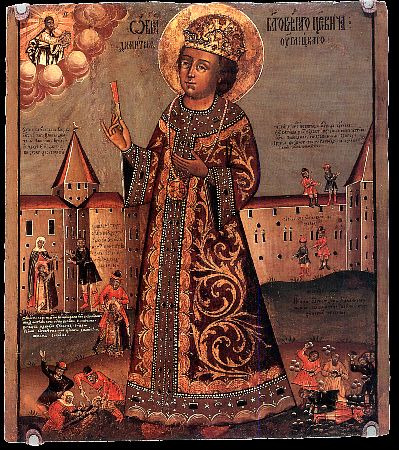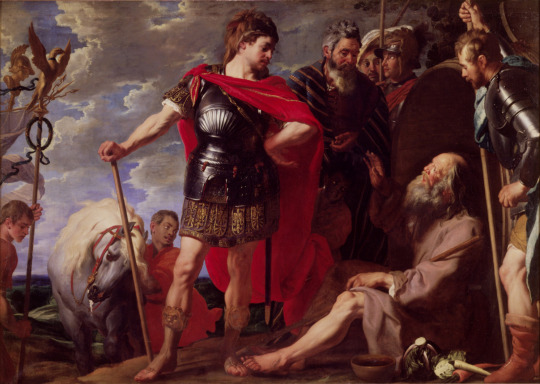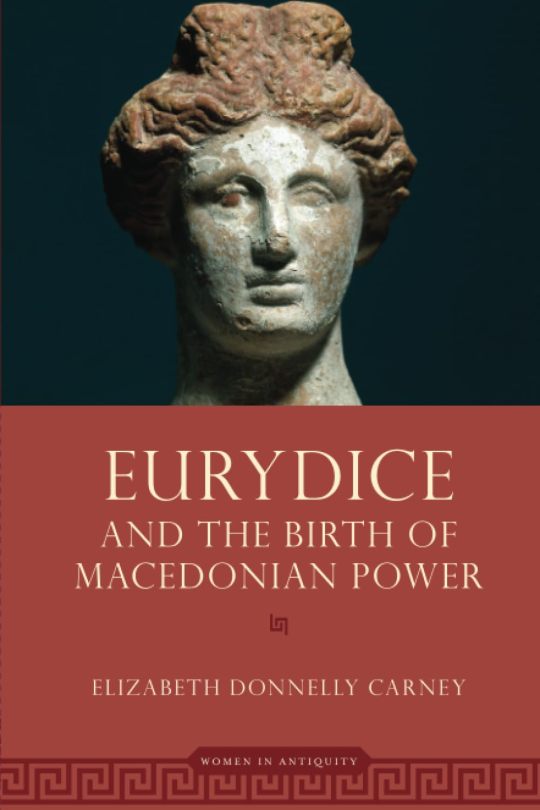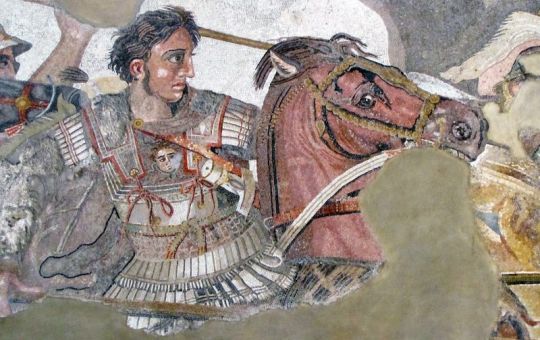#inheritance in Macedonia
Explore tagged Tumblr posts
Note
How important was it, really, that Alexander didn't have more brothers? He had Karanos, and it there's the gossip that ATG or his mother killed the boy. Philip Arridhaios apparently wasn't seen as a direct challenge and ATG kept him around. But if Philip had more healthy male offspring around Alexander's age, would that have threatened his hold on power, the partition of the empire or even the military campaigns themselves (the brothers becoming generals for example)?
Philip’s (Lack of) Sons
So, first I need to correct the bit about Karanos. He didn’t exist. Justin gave baby Europē a sex-change. No historian reports two children for Kleopatra Eurydikē, and Justin alone names a boy. We get two children when modern historians try to reconcile Justin and Diodoros/others. But Justin gets things wrong a lot. So, where Justin disagrees with other historians, I’ll go with the others (especially if it’s more than one). Justin wasn’t simply epitomizing Pompeius Trogus; he had his own agendas and themes, so he changed things when it suited him.
Therefore, “Karanos” = Europē,* born just a few days (maybe a week or two) before Philip’s murder.
The wives and children of Philip are reported in a fragment from Satyrus preserved in Athenaeus (13.557b-c). Of his (living) children, we have four girls (Kynannē, Kleopatra, Thessalonikē, and Europē), and only two boys (Arrhidaios and Alexander).
I specify living because ancient accounts don’t usually list children who died young unless it somehow impacted events. So, the murder of Europē, which led to the suicide of Kleopatra Eurydikē, means Europē got a mention whereas if she’d died of some childhood disease, we’d probably not hear about her.
Ergo, it’s possible Philip did sire other children who simply didn’t survive long enough to make it into the histories—especially if they’d been born (and died) in his earlier years. In Dancing with the Lion, I invented a son (Menelaos) by the shadowy Phila of Elimeia, who died young, specifically to illustrate that point.
The two-to-four ratio of boys to girls suggests Philip fathered girls more than boys. Would more boys have endangered Alexander’s place? Certainly, if they were around his age. But not if they were notably younger—another point I make in Dancing with the Lion: why Alexander is less upset by Philip’s seventh marriage than his mother. The chance that Kleopatra Eurydike might bear a male child threatened Olympias’s position far more than Alexander’s. Even some of my colleagues seem to forget that. While yes, sons and mothers did form a political unit at polygamous courts, that doesn’t mean that threats to the mother’s status necessarily entailed threats to a son’s. Philip’s marriage to Kleopatra Eurydikē was just such a case. Any son she produced would’ve been so far behind Alexander in achievements (and thus, a shot at the throne), that the marriage was no threat—which is why he attended the wedding. That makes events at the wedding very curious indeed! And convinces me that we don’t even begin to have the whole story there.
I made up some things in Rise (no spoilers), precisely because we don’t know and I had to come up with something that didn’t make Alexander into a reactionary rube. Too often people point to him as a “hotheaded youth” who made a mountain out of a molehill at his mother’s instigation. Folks, he was eighteen or nineteen. Hotheaded (always), but not some little kid to jump at shadows and Mommy’s tales. Something truly threatening generated that level of reaction from him (and beyond what Diodoros relates at the wedding). It wasn’t fear of being replaced by an as-yet-not-even-conceived infant brother--unless Philip had other reasons to replace him, and there weren’t any … on the face of it.
Anyway, I want to end by pointing to the Big Pink Elephant in the room that way too many people seem to forget….
AMYNTAS PERDIKKA was Alexander’s chief rival, not Arrhidaios or a fictional infant brother. Amyntas was older than Alexander, the only son of Philip’s older brother Perdikkas (III), who’d been king before Philip. Amyntas didn’t become king when his father died in battle precisely because he was only about a year old, while Philip was c. 23/24, and the kingdom was in crisis. Being a baby was also why Philip didn’t kill him. He needed an heir until he could father his own.**
So despite being the eldest Argead after Philip and the legitimate son of a former king, Amyntas spent his life as “the spare.” Imagine the resentment that would have generated. It’s not an accident that Alexander had him killed inside six months of taking the throne. And it’s probably in that time frame that Amyntas would’ve staged a bid for the throne himself. After all, not only was he an Argead, with military experience, he was married to Philip’s eldest child, who was already pregnant, showing he was fertile. He had a really good claim.
Such a clearing out of competing Argeads was standard for any new king’s first year or so. It’s what whittled down available Argead males from the five sons (and progeny) of Alexandros I to just three at Philip’s death, a hundred years later: Amyntas, Alexander, and Arrhidaios. Alexander wasn’t unique in house-cleaning. Philip had killed his three half-brothers upon taking the throne, keeping only Amyntas, his nephew. This was so typical it’s of note that Alexandros II not only didn’t get rid of Perdikkas (III) or Philip (II), but kept around his half-brothers too. It was the exception, not the rule (perhaps because all of them were still too young to be a threat?).
So basically, given Argead patterns, the survival of male siblings/cousins depended on a couple things:
The age of the sibling(s)/cousins. Siblings and half-siblings who were notably younger were likely to be spared if they didn’t appear to offer an immediate threat. After all, the new king needed an heir until he could father his own.
The apparent competence of the sibling(s)/cousins. Arrhidaios is our best evidence for this: Alexander took him with him to Asia to keep an eye on him—prevent his use as a stooge in a coup—but he otherwise kept him alive.
The king’s personal relationship with the sibling(s)/cousins. This is obviously very hard to determine, as our sources may not tell us, or not tell us honestly, but even if it’s hard, that doesn’t mean we should neglect it as a possible motivating factor. It may, in fact, explain why Alexander II (Philip’s older brother) didn’t kill his siblings. He may have loved them (and them, him). While we can’t say from the evidence, we also shouldn’t dismiss that as a possible motivating factor.
Here's an earlier posts about Amyntas, btw.
AMYNTAS PERDIKKA
* The names themselves are a give-away. “Europē,” like “Thessalonikē” was bestowed in celebration of Philip’s military victories. By contrast, “Karanos” (which means generic “chief”) isn’t a royal Macedonian name at all. Bill Greenwalt talks about the name’s significance in one of his articles, but I can’t now recall which.
** There is some question as to whether Amyntas was ever king, however briefly, due to a reference to an “Amyntas IV.” But many of us believe that was part of a challenge to Alexander later, not proof that Amyntas was king briefly, and Philip his regent.
#asks#Philip II of Macedon#Philip of Macedon#Alexander the Great#Arrhidaios#Perdikkas III of Macedon#Alexander II of Macedon#Amyntas Perdikka#ancient macedonia#Argead Macedonia#Inheritance in Argead Macedonia#Karanos#Justin lies
27 notes
·
View notes
Text

A complex figure, Irene of Athens (c.750/755 - 803) was the first woman to rule the Byzantine Empire in her own name. For over two decades, she dominated imperial politics with a rare blend of resilience, cunning, and charisma. She also stood out for her philanthropic initiatives and enduring cultural legacy.
Empress consort
Irene was born in Athens between 750 and 755, into the Sarantapechos family—a locally influential clan of unclear standing, likely outside the upper echelons of the aristocracy. Her marriage to the young Emperor Leo IV in 769 was likely arranged to bind Greece more closely to Constantinople’s authority. Irene arrived in the capital that November and was crowned empress shortly after.
Her father-in-law, Constantine V, was a staunch iconoclast, while Irene already showed signs of favoring the veneration of religious images—a theological rift that may have created tension with her husband.
In 771, Irene gave birth to her only child, Constantine VI. When Leo IV died suddenly in 780, she was left to protect both her son’s inheritance and her own position.
Irene in power
Irene swiftly seized control of the government, and she and her son were proclaimed co-rulers. But her authority was soon challenged. Leo’s half-brothers, each holding the title of Caesar, conspired to overthrow her and install the eldest, Nikephoros, as emperor.
Irene dealt with them decisively. She punished their supporters and forced the princes into clerical life, effectively neutralizing their claim. Symbolically, she had them serve at the Great Church during Christmas Mass and restored a crown that her husband had removed from the Hagia Sophia—an act rich in political and religious significance.
She soon appeared alongside her son on imperial coinage and took a leading role in foreign affairs. In 781, she arranged his betrothal to Rotrude, daughter of Charlemagne.
Aware of her precarious position, Irene surrounded herself with loyal servants, notably eunuchs, whom she promoted to high office. Though often capable, their presence in military leadership roles drew resentment from the army. As a woman unable to lead troops herself, Irene depended on these trusted men—and the strategy was not without consequences, for some of her allies later proved treacherous and corrupt.
In 781, she dispatched an expedition suppress a rebellion in Sicily, which successfully restored Byzantine control over the island. Yet in the East, her policy faltered: a general defected during a campaign against the Arabs—perhaps out of hatred for the eunuch Staurakios, or due to Irene’s purge of Constantine V’s loyalists. The fallout forced her to pay a massive tribute to secure peace.
Pacifying Thrace
On the northern frontier, however, Irene scored lasting victories. In 784, she sent Staurakios to campaign against Slavic tribes in Thrace and Greece. His triumph brought back booty and captives, and Irene celebrated his return with honors.
In May of that year, she embarked on a public tour of Thrace with her son—a gesture that left a powerful impression. She fortified and renamed Beroia as Eirenoupolis (“City of Irene”), symbolizing renewal and imperial authority. Her efforts stabilized Northern Thrace that had largely escaped imperial control for two centuries. She cemented these gains by founding a new theme (the military-administrative division): Macedonia.
Champion of icons
A devout patron and builder, Irene founded the Convent of the Mother of God on Prinkipo and played a crucial role in resolving the iconoclasm controversy.
In 787, after carefully neutralizing potential military opposition, she summoned the Second Council of Nicaea. There, she overturned her father-in-law’s policies and restored the veneration of icons, marking a monumental shift in Byzantine religious life and reviving iconophile art.
Constantine VI attempts to rule alone
By 788, Irene’s name began to precede that of Constantine VI in official proclamations. She dominated his life and eventually broke off his engagement to Rotrude, arranging a new marriage with Maria of Amnia. She opposed Charlemagne’s growing influence in southern Italy and launched a military expedition that ended disastrously.
Frustrated, Constantine sought to assert his authority. In 790, provincial troops acclaimed him as sole emperor. He had Irene’s eunuchs punished and exiled, and confined her to the Palace of Eleutherios.
Yet his reign floundered. After a series of military defeats, including a humiliating loss to the Bulgars in 792, Constantine reinstated his mother as co-ruler. Their uneasy joint rule descended into chaos. As the chronicler Michael Psellos wrote:
“They went for each other, hit and hit back in turn, and now Irene exercised absolute power, now Constantine took possession of the palace alone, again the mother, again the son, until their conflict resulted in a disaster for both.”
Constantine further alienated the court by divorcing his wife and remarrying—an act that scandalized the clergy and nobility alike.
Sole Ruler of the Empire
By 796, Irene had outmaneuvered her son. She won over the army and her household through persuasion and bribes. In August 797, Constantine attempted to flee the capital but was captured by Irene's allies. Irene had him blinded in the porphyra, the chamber where she had once given birth to him.
Blinding, though brutal, was seen as a merciful alternative to execution. Whether he survived is uncertain; some sources suggest he lived until 805.
Now ruling alone, Irene struck coins bearing only her image. She used the masculine form basileus on some of her legal documents and used the masculine title autokrator, asserting full sovereignty.
Her rule wasn’t, at first, met with much opposition. Irene had carefully prepared her ascension.

Imperial philanthropy
Irene’s reign was marked by a deep commitment to philanthropy. Her concern for the poor seemed genuine, not merely political. She abolished taxes levied on soldiers’ widows and exempted orphanages, hospitals, and religious institutions from hearth taxes— a relief her successor would later revoke.
A prolific builder, she was interested in developing the capital. She funded public works, established soup kitchens, retirement homes, and free graveyards for foreigners and the poor. She reduced taxes and, in 799, distributed coins to the people during a ceremony.
The last years
Irene’s later years were fraught with challenge. In 798, she sent envoys to both the Arabs and the Franks, striving to keep military conflict at bay, but failed to secure peace with the Arabs.
She extended imperial administration into the Balkans and possibly created new provincial units in Greece. Her treasury remained strong, with substantial reserves at her disposal.
She fell ill in 799 and the crowning of Charlemagne as “Emperor of the Romans” by the Pope in 800 seriously undermined her legitimacy. The Byzantines considered themselves the true heirs of Rome, and the coronation was a major blow to Irene’s prestige.
She seems to have proposed marriage to Charlemagne, possibly to unite the eastern and western empires and ensure peaceful cooperation. Frankish ambassadors arrived in Constantinople, but the plan came to nothing.
By 802, dissatisfaction at court had reached a tipping point. Irene’s failure to designate a successor led to her downfall. Her finance minister, Nikephoros, staged a coup and was proclaimed emperor. Deserted by her allies, Irene was exiled—first to Prinkipo, then to Lesbos where she was closely guarded, most likely because she had plotted against her successor.
She died on August 9, 803. Her remains were later returned to the convent she had founded. That she managed to hold power for so long—despite lacking support and governing in a deeply patriarchal society—testifies to her extraordinary political acumen.
If you enjoy this blog, consider supporting me on Ko-fi!
Further reading:
Garland Lynda, Byzantine Empresses - Women and Power in Byzantium AD 527-1204
Herrin Judith, Women in Purple: Rulers of Medieval Byzantium
#irene of athens#Irene Sarantapechaena#history#women in hstory#women's history#8th century#9th century#historyedit#byzantine history#byzantine empire#eastern roman emire#female rulers#byzantine empresses#herstory
128 notes
·
View notes
Text
Winx Club Headcanon: War(s) of Solaria
In my headcanon, Solaria isn’t like it was shown in the original series. It was a war-torn kingdom with a history of vertical and horizontal conflicts between the Solarians and Lunarians. Though, in the present day, the kingdom has recovered significantly, in terms of socioeconomic and politics, the past friction and hatred between Solarians and Lunarians are still present and both people now live in separate places (Solarians in Solaria and Lunarians in Lumenos). The war(s) is what caused Stella’s parents to divorce (because I don’t think the original series explains why they separated). This writing will dive into Cassandra’s conspiracies that caused the long conflict and its effect(s) on the kingdom. Also, I will be referring to some ancient Greek/Roman/Babylonian history in terms of the culture, society, and politics of Solaria.
************************************************************************
In the year 668 of the Solarian calendar (The Solarian Calendar draws inspiration from the lunisolar calendar of Ancient Macedonia), Prince Radius of Solaria married Princess Luna of Lumenos, and both became the new King and Queen of Solaria and the first rulers to unite the two people in the planet, the Solarians and Lunarians. Both earned the title “Sun God Shamash” and “Moon Goddess Yarikh” by both people.
In the year 670, two years after their marriage, their first and only daughter was born. They named her Stella—blessed with the title “Ishtar” (meaning Evening Star). She grew up to be a talented, genius young princess and has a natural affinity for magic. Young Princess Stella would soon create her derivation of light magic, drawing sources from both of her parents’ inherited magic (sun and moon magic), Star Magic was born. Princess Stella quickly became the strongest candidate for the Solarian throne due to her brilliance.
This news was a sign of fortune for the Kingdom of Solaria, but for others, it was a threat. Enters Countess Cassandra, a member of the Royal Court of Solaria and Duchess of Sh’va (pronounced “shee-ba”)—one of the regions in Solaria, she was one of the most respected members of the high council and the most influential. This news upset the countess, she had an ambition to take over the kingdom and made herself queen. But King Radius’ success in uniting the Solarians and Lunarians through inter-cultural marriage and the positive perceptions of the royal council and the public regarding Stella, only minimizes the chances of her coup d’etat plan (to be honest I based Cassandra off of Agrippina The Younger, and her conspiracy to dethrone and assassinate Emperor Claudius and made Nero—her son—emperor of Rome. Just like Cassandra who desires her daughter, Chimera, to be the Princess of Solaria)
So, in the year 682, Cassandra’s conspiracy starts its first move. By abusing her power at the Royal Court, Cassandra launches several “campaigns” in the grassroots community of Solaria and uses the “divide and conquer” tactics because what’s a better way to destroy a multicultural society than to divide them and put them onto each others’ throats? Cassandra sent several mercenaries to attack the Solarian community near Sh’va. These mercenaries wear Lunarians’ traditional clothing and a cloak with Lumenos symbols on it. The injured civilians believed that the Lunarians had attacked them, sparking rages all over the region, and within days, Sh’va became a war zone between the Solarians and Lunarians who lived there. Cassandra took this advantage to send spies into the other regions, these spies acted as provocateurs and also informants to Cassandra. Within a couple of months, chaos spread all over Solaria, civil unrest was inevitable and the streets turned into a pool of blood. The Royal Court informed Radius and Luna about this and demanded them to take immediate action.
The Royal Court, comprised of both Solarian and Lunarian descents started to blame each other for the war. However, the Solarians believed that the Lunarians were the ones who started the conflict by pointing weapons at them first. This argumentation and conflicts occurred both horizontally (between civilians) and vertically (between the members of the Royal Court), prompting the King and Queen to act.
The situation worsened when the Solarian High Council pushed King Radius to launch an attack at a possible Lunarian rebels' hideout, located in a region called Enzu. Radius complied believing that it was their hideout ended up killing roughly one hundred Lunarian civilians. His action enraged Luna. Radius commands the army without discussing it with his wife first or even confirming that there were no civilians in that region, this results in a heated argument between the two. Luna, feeling betrayed and disappointed with the Solarians and Radius, decided to side with her people.
The war continues, and although both King and Queen have stepped in to try to ease the situation, the culmination of all the events happens one night, when an angry Solarian mob storms the Temple of Yarikh and destroys it along with all of its contents including the artifacts, some sacred tablets and the statue of the goddess. Of course, this enraged the Lunarians because the Temple of Yarikh is the sacred place built for Luna, and the Solarians soiled the sacred temple. The Lunarians decided to launch an attack on the Solarians but Luna warned them not to act recklessly because they were easily outnumbered. Instead, Luna suggested that both sides sign a treaty of peace because they are already too many casualties from both sides.
The treaty happened in the year 685. The treaty of peace contained an agreement that both sides must follow: “...the planet of Solaria belongs to the Solarian people and therefore planet Lumenos belongs to the Lunarian people.” Both sides parted ways, and soon after Radius and Luna signed the treaty, they were divorced. There is no point in retaining their marriage after all of this bloodbath. The year 685, marked the end of the lunisolar calendar that was used in Solaria and Lumenos for centuries, both changed their calendars, marking the end of the Year of The Sun and Moon and in Solaria it became year 1 of the new Solarian calendar—also called as the Year of The New Sun while in Lumenos it was called the Year of The New Moon.
Hence, the first step of Cassandra’s conspiracy is complete. She had succeeded in removing Luna from the Royal Family.
After they divorced, Radius was busy rebuilding and revitalizing Solaria. Radius turned into a workaholic and even though he loves his daughter, he has too little time to be with her. Stella, the genius princess, grows up to be a teenager with abandonment issues, she often seeks validation from other people and gets in trouble just to gain her father’s attention. Her relationship with her mother was not better either, Stella has a complicated relationship with her mother, she doesn’t hate her because she “abandons” her family but Stella always feels that there is a gap between her and her mother. To the point that she became scared when she had to face her mother, not because she viewed her as a traitor to her family but because of the past that she kept seeing in her, a time when all of them were still together.
After a few years, Cassandra decided it was time to move on to her second plan—assassinating Stella and dethroning Radius. But there’s a problem, Stella goes to Alfea to study how to become a fairy and it becomes impossible for Cassandra to assassinate her. So, she sticks with her plan to dethrone Radius first, of course, she needs to be more careful this time because Radius is much more cautious.
Luckily for Solaria, it took Cassandra some time to strategize and the evil woman was too comfortable basking in her victory. We’ll see what she has up her sleeves.
23 notes
·
View notes
Text
The Twilight of Babylon

Babylon burned with light. Silks danced in the halls, and incense filled the air with sweet rot. But Alexander felt none of it. He walked through the palace like a ghost, his body thinner, his steps slower. Even the wine tasted like ash.
He sat beside Hephaestion’s bed for three days. When his friend passed, Alexander did not cry. He simply folded the warrior’s hands over his chest, placed a coin on each eye, and whispered a final command to the gods:
“Wait for me.”
His generals saw the change immediately. He no longer rode. He no longer planned.
Each day, he lost more weight. His fever surged, and the visions began again—his mother’s face, his father’s shadow, Roksara’s firelit eyes, and the impossible colors of Kaelen’s mismatched stare.
On the ninth day, as the sun crawled across the palace walls, Alexander whispered one thing:
“The strongest.”
And then, the breath left him.
The conqueror of the world—who had stood at the edge of India, who had fought through sandstorms and betrayal, who had touched the divine—died not with a roar…but with the memory of a son he had barely begun to know.
---
Far to the east, in the mountain kingdom of Zaramea, a hawk circled the shrine.
Kaelen was at the edge of the cliff, practicing his forms with the sword Alexander had left him. His movements were sharp, precise—each swing an echo of inherited grace. Below him, the valley stretched wide and wild, untouched by empire.
He sensed the rider before he saw him.
The messenger bore the royal seal of Babylon. His face was pale, as if the desert had drained him dry. He knelt and presented the papyrus.
Kaelen opened it with steady hands.
The words were few.
Alexander of Macedonia, Son of Philip, King of Kings, has fallen. Hephaestion followed him into the next world. The crown is broken. The world fractures. You are named, in the last line of his hand, as blood and flame. He called you his strongest.
Kaelen read the words twice. Then once more.
Behind him, Roksara stepped forward. She didn’t speak. He tossed the papyrus in the fire.
“I won’t go to Babylon,” he said.
“No,” Roksara agreed. “You were never meant for ruins.”
He turned, eyes gleaming—one brown, one green.
“What was he, to you?” he asked her quietly.
She answered without hesitation. “War. And love. And ruin. But also—your father.”
Kaelen nodded.
Then he lifted Alexander’s sword, and for the first time, raised it to the sky as the hawk called out overhead. Not to conquer. Not to claim. But to begin.
The men of Zaramea watched from the cliffs. The women and elders, too. No cries were given. No crown offered.
And yet, in that moment, a new force was born—neither king nor myth. Just a boy with fire in his veins and the gaze of a god.
A son of two worlds. The end of one empire. And the beginning of something far greater.
#historical fiction#alexander the great#hephaestion#alexander the great fiction#alexander the great historical fiction#alexander the great fanfiction#alexander the great fanfic#alexander the great fic#ancient historical fiction
2 notes
·
View notes
Text

Someday, Ukraine will be without Su-25 attack jets. That's why she wants the A-10 ex-USAF
Fernando Valduga By Fernando Valduga 02/18/2024 - 00:19 in Military, War Zones
Despite some losses since the beginning of the Russian invasion of Ukraine almost two years ago, the fleet of Ukrainian Su-25 attack jets continues with a practically equal number. Even so, the Ukrainian military dreams of having in their hands the A-10 Warthogs that the USAF has been withdrawing from operation.
Russian forces shot down a Sukhoi Su-25 attack jet from the Ukrainian Air Force while it was carrying out a combat raid over eastern Ukraine in early February. Pilot Stanislav Rykov, a veteran of more than 380 missions - about one sup every day since Russia expanded its war against Ukraine - died tragically.
I regret for Rykov, but do not regret - yet - for the 299ª Tactical Aviation Brigade of the Air Force, the only Ukrainian operator of the subsonic twin-engine jet Su-25. Almost two years after Russia's attack, the 299ª Brigade has... exactly the same number of Su-25 with which it started.

This does not mean that the Air Force is not looking at the day when the old Su-25s will begin to end. No wonder some Ukrainian authorities have been asking for the Fairchild Republic A-10 attack jets that are being retired from the U.S. Air Force.
The Ukrainian Air Force inherited dozens of armored Su-25s from the Soviet Air Force, when it withdrew from Ukraine after 1991. At the beginning of 2022, 43 of the old planes could still fly, according to aviation journalist Vladimir Trendafilovski.

The journalist counted 30 operational Su-25s, one that was undergoing review at the Zaporizhzhia State Aircraft Repair Plant, in addition to another 12 that were stored in Mykolaiv-Kulbakino, the base of the 299ª Brigade in southern Ukraine.
When Russia invaded Ukraine on February 24, 2022, the Su-25 and their pilots and crews spread through Ukraine to dodge Russian missiles - and then went into action, advancing towards Russian forces at extremely low levels to drop bombs and fire rockets.

In the following two years, the Russians slaughtered or exploded 18 Su-25 jets and killed many pilots. But among them, Macedonia and Bulgaria donated to Ukraine the same 18 Su-25. Although it is possible that the 299ª Brigade stripped some of the donated fuselages to obtain spare parts, it is also possible that the unit cannibalized the former Soviet former Sukhois - and put the donated jets into action.
All this means that, despite the heavy losses, the 299ª Brigade continues in the fight. It is the same situation in which the other brigades of the Ukrainian Air Force find themselves. Units that fly Sukhoi Su-24 bombers, Sukhoi Su-27 fighters and Mikoyan MiG-29 fighters maintained their strength on the front line by acquiring new jets from abroad - in the case of MiG-29 squadrons - or reactivating old stored jets.

Still, the Ukrainian authorities seem to understand that there is no longer an abundance of Su-25 in excess in the arsenals of the allied countries. Any additional losses could harm the force of the 299ª Brigade.
Therefore, it should come as no surprise that General Oleksandr Syrsky - former head of the ground forces, now head of all armed forces - has his heart turned to the American A-10. The A-10 twin-engine subsonic is largely similar to the Su-25. In fact, it is better protected and much better armed.

USAF A-10 flies along a Su-25 from Bulgaria.
“This is not a new machine,” Syrsky said of the A-10, “but a reliable machine that has proven itself in many wars and that has a wide range of weapons to destroy land targets to help the infantry.”
The U.S. Air Force operated about 200 A-10 jets from the 1970s and 1980s. Hundreds of others are stored. There is no reason why, after a few months of training, Ukrainian pilots could not pilot the resistant attack jets.

Rendering of an A-10 in the same pattern as a Ukrainian Su-25.
But there are political reasons why the 299ª Brigade never gets the A-10. Since last autumn in the northern hemisphere, Republicans aligned with Russia in the US Congress have refused to vote on any additional aid to Ukraine: aid that could provide Ukrainians with ammunition, armored vehicles, artillery and - yes - warplanes.
Therefore, the 299ª Brigade must settle for its approximately 40 Su-25 jets - or queue up to receive new jets from any donor other than the United States. Say, Lockheed Martin F-16 from Norway, the Netherlands and Denmark or, potentially, Dassault Mirage 2000 from France.
Source: Forbes
Tags: A-10 Thunderbolt IIMilitary AviationUkraine Air ForceSu-25 FrogfootWar Zones - Russia/Ukraine
Sharing
tweet
Fernando Valduga
Fernando Valduga
Aviation photographer and pilot since 1992, he has participated in several events and air operations, such as Cruzex, AirVenture, Dayton Airshow and FIDAE. He has works published in specialized aviation magazines in Brazil and abroad. He uses Canon equipment during his photographic work in the world of aviation.
Related news
MILITARY
Philippines close to closing deal to buy 12 to 14 Gripen fighters
17/02/2024 - 16:30
MILITARY
India will spend $3.5 billion on planes to increase the surveillance capacity of the Indian Navy
17/02/2024 - 16:00
MILITARY
Ukraine claims to have shot down three Russian jets, two Su-34 and one Su-35
17/02/2024 - 12:10
MILITARY
India's attempt to sell Tejas jets to Argentina receives new impetus
16/02/2024 - 20:00
ARMAMENTS
Italy will buy more StormBreaker bombs and AMRAAM missiles for its F-35 fighters
16/02/2024 - 16:00
The first C-130J-30 Hercules of the Royal Air Force of New Zealand to leave the Lockheed Martin production line in Georgia, USA. (Photo: RNZAF)
MILITARY
VIDEO: New Zealand's first new C-130J-30 Super Hercules leaves the painting hangar
16/02/2024 - 13:00
9 notes
·
View notes
Text
Saints&Reading: Tuesday,
may 15_may 28
THE SLAIN CROWN PRINCE DEMETRIUS OF MOSCOW (1591)

Born October 19, 1582 and was the son of Ivan IV Vasilyevich, more commonly known as Ivan Grozny or Ivan the Terrible.
Ivan was succeeded by his much less capable son, Feodor, upon his death in 1584. According to some, the new Tsar Feodor was not only feeble in body, but also in mind. This meant that Feodor was a ruler only in name, and that real power was in the regency council that was established to guide the Tsar. One of the most prominent figures of the council was Boris Godunov, the Tsar’s brother-in-law.
Feodor and his wife, Irina, did not produce an heir, and, according to one popular account, BorisGodunov was hoping to occupy the Russian throne once Feodor died. In order to achieve this, Boris Godunov would have to have to get rid of the last of Ivan’s sons, Dmitri.
In the year that Ivan died, Dmitri, his mother, and his uncles were exiled to Uglich, the Tsarevich’s appanage city.
Wanting to get rid of the rightful heir to the Russian throne, Boris Godunov began to act against the prince as against a personal enemy. At first he tried to slander the young heir to the throne, spreading false rumors about his alleged illegitimate birth. Then he issued a new invention that if Demetrius had inherited his father's harshness Sovereign. As these actions have not brought the desired, the insidious Boris decided to destroy the prince.
An attempt to poison Demetrius was not a success: the deadly potion did not harm the child. Then the villains decided to hide the crime. In Saturday May 15, 1591, the young prince Demetrius walked in the yard with his nurse. The killers, Osip Magi, Danilo Bitiagovsky and Nikita Katchalov, brutally stabbed prince.
Prince Dimitri was buried in Uglich, in the palace church of the Transfiguration of the Lord. Many miracles and healings began to be made at his tomb, especially often healed the sick eyes. A July 3, 1606 the holy relics of martyr Tsarevich Dimitri were found incorrupt.
Source:
After numerous miracles of healing from the holy relics, three feastdays for the Tsarevich Demetrius were established during this same year of 1606, his birthday (October 19), his murder (May 15), and the transfer of his relics to Moscow (June 3).
Source: Russian Orthodox Cathedral of St John the Baptist
SAINT ACHILLES, BISHOP OF LARISSA (330)

Saint Achilles, Bishop of Larissa, lived during the fourth century, during the reign of Saint Constantine the Great. Glorified for his holiness of life and erudition, he was made Bishop of Larissa in Thessaly.
Saint Achilles participated in the First Ecumenical Council, where he boldly denounced the heretic Arius. In his city he strove to promote Christianity, destroyed idolatrous pagan temples, and he built and adorned churches.
Saint Achilles had the gift of healing sickness, especially demonic possession, and he worked many miracles. The saint died peacefully in about the year 330. His relics have remained in Prespa, in today's Republic of Macedonia, since 978.


ACTS 10:21-33
21 Then Peter went down to the men who had been sent to him from Cornelius, and said, "Yes, I am he whom you seek. For what reason have you come?" 22 And they said, "Cornelius the centurion, a just man, one who fears God and has a good reputation among all the nation of the Jews, was divinely instructed by a holy angel to summon you to his house, and to hear words from you." 23 Then he invited them in and lodged them. On the next day Peter went away with them, and some brethren from Joppa accompanied him. 24 And the following day they entered Caesarea. Now Cornelius was waiting for them, and had called together his relatives and close friends. 25 As Peter was coming in, Cornelius met him and fell down at his feet and worshiped him. 26 But Peter lifted him up, saying, "Stand up; I myself am also a man." 27 And as he talked with him, he went in and found many who had come together. 28 Then he said to them, "You know how unlawful it is for a Jewish man to keep company with or go to one of another nation. But God has shown me that I should not call any man common or unclean. 29 Therefore I came without objection as soon as I was sent for. I ask, then, for what reason have you sent for me? 30 So Cornelius said, "Four days ago I was fasting until this hour; and at the ninth hour I prayed in my house, and behold, a man stood before me in bright clothing, 31 and said, 'Cornelius, your prayer has been heard, and your alms are remembered in the sight of God. 32 'Send therefore to Joppa and call Simon here, whose surname is Peter. He is lodging in the house of Simon, a tanner, by the sea. When he comes, he will speak to you.' 33 So I sent to you immediately, and you have done well to come. Now therefore, we are all present before God, to hear all the things commanded you by God.
JOHN 7:1-13
1 After these things Jesus walked in Galilee; for He did not want to walk in Judea, because the Jews sought to kill Him. 2 Now the Jews' Feast of Tabernacles was at hand. 3 His brothers therefore said to Him, "Depart from here and go into Judea, that Your disciples also may see the works that You are doing. 4 For no one does anything in secret while he himself seeks to be known openly. If You do these things, show Yourself to the world. 5 For even His brothers did not believe in Him. 6 Then Jesus said to them, "My time has not yet come, but your time is always ready. 7 The world cannot hate you, but it hates Me because I testify of it that its works are evil. 8 You go up to this feast. I am not yet going up to this feast, for My time has not yet fully come. 9 When He had said these things to them, He remained in Galilee. 10 But when His brothers had gone up, then He also went up to the feast, not openly, but as it were in secret. 11 Then the Jews sought Him at the feast, and said, "Where is He?" 12 And there was much complaining among the people concerning Him. Some said, "He is good"; others said, "No, on the contrary, He deceives the people." 13 However, no one spoke openly of Him for fear of the Jews.
#orthodoxy#orthodoxchristianity#easternorthodoxchurch#originofchristianity#spirituality#holyscriptures#gospel#bible#wisdom#faith#ssaints
4 notes
·
View notes
Text
CHARACTER INFO SHEET
tagged by: @caemthe thank youuu tagging: @toadmiretoweepover , @grandordergirl , @heroicmenagerie , @voidfragments

Name: Orpheus Name meaning: "Darkness of Night" Alias: God of Music, Son of Apollo Ethnicity: Greek
THREE HEADCANONS YOU’VE NEVER TOLD ANYONE:
He never particularly cared for Dionysus as his divine patron, finding him to be more of a hassle than it was worth. Honestly had it been up to Orpheus he would have dedicated himself to Hestia or even Demeter. But sadly Dionysus called dibs the first time Orpheus made a public appearance with his music, much to Apollo's fury later though it did little in the eyes of Zeus who approved it.
Music is not the only divine gift Orpheus inherited from his father though it is the single-most powerful ability he has. Though he didn't inherit any talents in medicine or archery, he did unfortunately have a minor gift in prophecy. Much to his immense distress as a young child when dreams of the future would strike him and leave him sobbing in fear and confusion in his mother and father's arms.
Apollo did indeed help raise Orpheus personally, even bringing him to the Muses once his talent in music began to make itself known so they could help him refine it. However, Orpheus holds no illusions as to his father's true nature, no matter how much he may love him. And so he'll embrace his role as the favorite and youngest child to call Apollo out on his shenanigans whenever it's necessary.
THREE THINGS YOUR CHARACTER LIKES DOING IN THEIR FREE TIME:
Flower arranging, a habit picked up from his mother.
Writing poems and songs.
Surprisingly, he enjoys throwing the discus.
SIX PEOPLE YOUR CHARACTER LIKES/LOVES:
His mother, the daughter of the king of Thrace/Macedonia. (nameless because thanks greek mythology)
Asclepius (half-brother, the only one he knew)
Apollo (father)
Eurydice (best friend since childhood)
Castor
The rest of the Argonauts except Herakles
TWO THINGS YOUR CHARACTER REGRETS:
Failing to save Eurydice from the Underworld. She didn't deserve to die so young, she deserved so much better. And he blamed himself for her death because she was gathering flowers for him to give to his ailing mother. A gift she intended to make him smile again like how he hadn't since his return from the quest for the golden fleece. Discovering she'd been attacked, that she'd been murdered, was the straw that broke the camel's back when it came to Orpheus' grief and terror of losing his loved ones. That's why he went to Hades...but in the end Orpheus was too human despite being more divine than mortal. His heart was too full of love... and so he doubted and looked back and failed. And he's never forgiven himself for it.
How he froze in fear when the Boreads enraged Herakles by suggesting the Argo sail away and leave him to his fruitless search if he wouldn't stop. Orpheus knows that if he had reacted in time he could have diffused the situation since his music can manipulate emotions in all beings. But he was just a youth barely more than sixteen at the time of the quest, and so he froze because of his sheltered life in the palace.
TWO PHOBIAS YOUR CHARACTER HAS:
Claustrophobia. There's no real reason for it, he's never been locked up that he can remember. But the idea of it terrifies him endlessly both in life and as a Servant. It doesn't help that his prophetic dreams made him feel trapped, unable to move or even scream when they would fall upon him in his sleep.
Thanatophobia, the fear of death. Specifically in Orpheus' case the death of those he loves. An unfortunate fear to have considering he watched so many people he cared for die either from illness, old age, or at the hands of others. When his own death came...he was only afraid of the madwomen who were tearing him apart. Death didn't frighten him, it was the events that led to his death that did.
#an endless tale; headcanon#divine musician enshrined in starlight; orpheus#i have a lot to say about my boy like so much#thank you for tagging me so i could ramble about him a bit!!#his name has no agreed upon meaning just like his origin story has like fifteen versions#so i just used the meaning i liked best and the origin i already use for him
3 notes
·
View notes
Text
alexander the great
before we get into the biography of someone who unironically called himself 'the great', and ignoring the fact that generally people AGREE with that epithet, it should be stated that if you get this result you should NOT take it as a sign to invade persia or egypt or india or any other sovereign nation. the time for that has passed, and alexander the great did inherit macedonia before going on his conquest, which is the ancient equivalent of donald trump getting a small loan of a million dollars from his father to start up his business. is what he created impressive? objectively, yes. did he start from a position that most people would never reach in their lifetimes? also yes. also, this is not comparing either alexander the great or you to donald trump, i'm not a monster. although... alexander DID name a lot of cities after himself... much to consider. keep an eye on your ego, i guess? if you ever find yourself considering building a phallic skyscraper with your name plastered all over it... do not. anyway, now that the disclaimer is out of the way: alexander the great!! one of the very very very few people on this list who has their own horrible histories song!! that's a big fuckin deal!! you are an incredibly passionate and intense person, and feel very strongly about a lot of things. you're never one to sit on the sidelines; you always have an opinion and you'll share it, particularly if someone in your vicinity is Wrong. although in pretty much every other aspect of your life you're pretty much fearless, romance is your achilles heel - literally, as you slept with a copy of the iliad beneath your pillow and by all accounts shipped achilles and patroclus like a gay tween after first reading the song of achilles (ooh, self burn, those are rare). you fall hard and fast, and often became a Gay Mess when in the presence of your lover. the less said about your reaction to the death of said lover, the better. also, you're a power bottom.
Yes. My man. I also love the completely unhinged bio.
a couple years ago, i got really ambitious and decided i was going to make a uquiz. it would be the uquiz to end all uquizzes, it would mean i used my history degree and it would be queer with a capital Q. and to be fair to past me, i did all the questions, had chosen what (or who, in this case) the results would be, and just had to write the bios for those results, which i did half of... and then crashed. two years later, i finally convinced myself to finish it off, so i mostly proudly present the 'which historical gay are you?' uquiz. if your result's bio is a little lacking, thats not because youre boring, it's because i'm chronically ill <3
11K notes
·
View notes
Text
Dio Chrysostom, On Kingship 4.4
Thus spoke Diogenes, counting it as nothing that he might be chastised, yet quite convinced that nothing would happen. For he knew that Alexander was a slave of glory and would never make a bad move where it was at stake. So he went on to tell the king that he did not even possess the badge of royalty.
And Alexander said in amazement, "Did you not just declare that the king needs no badges?"
"No indeed," he replied; "I grant that he has no need of outward badges such as tiaras and purple raiment—such things are of no use—but the badge which nature gives is absolutely indispensable."
"And what badge is that?" said Alexander.
"It is the badge of the bees," he replied, "that the king wears. Have you not heard that there is a king among the bees, made so by nature, who does not hold office by virtue of what you people who trace your descent from Heracles call inheritance?"
"What is this badge?" inquired Alexander.
"Have you not heard farmers say," asked the other, "that this is the only bee that has no sting, since he requires no weapon against anyone? For no other bee will challenge his right to be king or fight him when he has this badge. I have an idea, however, that you not only go about fully armed but even sleep that way.
"Do you not know," he continued, "that it is a sign of fear in a man for him to carry arms? And no man who is afraid would ever have a chance to become king any more than a slave would."
At these words Alexander came near hurling his spear.
With these words Diogenes strove to encourage him to put his trust in well-doing and devotion to righteousness and not in arms. "But you," he continued, "also carry in your soul a keen-whetted temper, a goad difficult to restrain, as we see, and compelling. Will you not throw off this armor which you now wear, don a worker's tunic, and serve your betters, instead of going about wearing a ridiculous diadem? And perhaps before long you will grow a comb or tiara as cocks do? Have you never heard about the Sacian feast held by the Persians, against whom you are now preparing to take the field?"
And Alexander at once asked him what it was like, he wished to know all about the Persians.
"Well, they take one of their prisoners," he explained, "who has been condemned to death, set him upon the king's throne, give him the royal apparel, and permit him to give orders, to drink and carouse, and to dally with the royal concubines during those days, and no one prevents his doing anything he pleases. But after that they strip and scourge him and then hang him.
"Now what do you suppose this is meant to signify and what is the purpose of this Persian custom? Is it not intended to show that foolish and wicked men frequently acquire this royal power and title and then after a season of wanton insolence come to a most shameful and wretched end?
"And so, when the fellow is freed from his chains, the chances are, if he is a fool and ignorant of the significance of the procedure, that he feels glad and congratulates himself on what is taking place; but if he understands, he probably breaks out into wailing and refuses to go along without protesting, but would rather remain in fetters just as he was.
"Therefore, O perverse man, do not attempt to be king before you have attained to wisdom. And in the meantime," he added, "it is better not to give orders to others but to live in solitude, clothed in a sheepskin." "You," he objected, "do you bid me, Alexander, of the stock of Heracles, to don a sheepskin—me, the leader of the Greeks and king of the Macedonians?"
"Surely," he replied, "just as your ancestor did."
"What ancestor?" he asked.
"Archelaus. Was not Archelaus a goatherd and did he not come into Macedonia driving goats? Now do you think he did this clad in purple rather than in a sheepskin?"
And Alexander calmed down, laughed, and said, "Do you refer to the story about the oracle, Diogenes?"
The other puckered his face and said, "Oracle indeed! All I know is that Archelaus was a goatherd. But if you will drop your conceit and your present occupations, you will be a king, not in word maybe, but in reality; and you will prevail over all women as well as all men, as did Heracles, whom you claim as an ancestor of yours."
Alexander said, "Women indeed! Or am I to understand that you refer to the Amazons?"
"Nay, it was no hard matter to overcome them," he replied. "I refer to women of another kind, who are extremely dangerous and savage. Have you not heard the Libyan myth?"
And the king replied that he had not. Then Diogenes told it to him with zest and charm, because he wanted to put him in a good humor, just as nurses, after giving the children a whipping, tell them a story to comfort and please them.
"Be assured," he continued, "that you will never be king until you have propitiated your attendant spirit and, by treating it as you should, have made it commanding, free-spirited and kingly, instead of, as in your present state, slavish, illiberal, and vicious."
Then was Alexander amazed at the courage and fearlessness of the man; yet deeming him to have greater knowledge than other men, he urgently besought him not to say him nay but to explain what his attendant spirit was and how he must propitiate it. For he assumed that he would hear some deity's name and of certain sacrifices or purifications that he would have to perform.
So when Diogenes perceived that he was greatly excited and quite keyed up in mind with expectancy, he toyed with him and pulled him about in the hope that somehow he might be moved from his pride and thirst for glory and be able to sober up a little.
For he noticed that at one moment he was delighted, and at another grieved, at the same thing, and that his soul was as unsettled as the weather at the solstices when both rain and sunshine come from the very same cloud. He realized, too, that Alexander despised the way in which he argued with him, due to the fact that the prince had never heard a real master of discourse but admired the style of the sophists, as being lofty and distinguished.
So wishing to win his favor and at the same time to show that he was quite able, whenever he chose, to make his discourse step out like a well-trained and tractable horse, he spoke to him as follows about attendant spirits, showing that the good and the bad spirits that bring happiness and misery are not outside the man, and that each one's intelligence—this and nothing more—is the guiding spirit of its owner, that the wise and good man's spirit is good, the evil man's evil, and likewise the free man's is free, the slave's slavish, the kingly and high-minded man's kingly, the abject and base man's abject.
"However, not to provoke a tedious discussion," he continued, "by taking up each separate point, I shall mention the commonest and most noticeable spirits by which everybody, generally speaking, is actuated—tyrants and private citizens, rich and poor, whole nations and cities."

0 notes
Note
Hello Dr. Reames, and happy holidays. I was wondering if Eurydice I, the mother of Philip, was genuinely involved in the conspiracy against her husband. Was she a woman who wielded significant power in her own right? Additionally, what was the role of Ptolemy of Aloros at court during that time?
Eurydike, Mother of Philip of Macedon
So...answering this turned into 10 pages (single-spaced) and I realized I have an article on my hands with something maybe not proposed before. Ergo, I'm going to give a pass on answering in full, but instead point to some prior work on Eurydike that I mentioned in my original opening, as it's not stuff I'd put in the article (except by way of footnotes), plus a short summary on S. Greek views of Macedonian/Illyrian/Epirote women, and a very quick background sketch on Eurydike herself.
The short answer is that nobody much today in Macedonian studies puts any credit on Justin's story about Eurydike as a duplicitous, evil mother. In her write up in the Lexicon, Sabine Müller puts it: "Trogus-Justin's tales about Eurydike as a vicious, murderous, scheming monster to whom a reprehensible trustful, even naive A(myntas) is completely devoted...deserve no credence" ("Amyntas III" LexAM). Although you will sometimes see this stuff recounted when written about by non-specialists, as a lot of the work on the topic has been done in article-form, or books more out of the mainstream.
----
I’ll open by pointing to a book that came out not too long ago and, in paperback, isn’t horribly expensive: Elizabeth D. Carney’s Eurydice and the Birth of Macedonian Power. I’ve recommended it before. It really is the place to start with Eurydike and the rise of Macedon women in the fourth century.
As many of you know, if you’ve been reading me any length of time, if you want to learn about Macedonian women—any of them—start with Beth Carney. In addition to Beth's book Kate Mortensen was the one to examine more carefully the negative stories about Eurydike, but Kate left academia, so her stuff is all earlier. In fact, Beth will cite her work in the monograph, so I don’t want to leave out Kate and her seminal “Eurydice: Demonic or Devoted Mother?” Ancient History Bulletin 6 (1992) 156-71. And of course, Kate was leaping off the work of Helen Macurdy much earlier. We must also note Sabine Müller’s Die Argeaden: Geschichte Makedoniens bis zum Zeitalter Alexanders des Großen (Schöningh Paderborn, 2016), as she discusses it as well there. Finally, William Greenwalt also works in early Argead Macedonia. Although he doesn't have a monograph, his “Amyntas III and the Political Stability of Argead Macedonia,” The Ancient World 18 (1988) 35-44, may be of interest to readers, as well as “Philip II and Olympias on Samothrace: a Clue to Macedonian Politics during the 360s” in Macedonian Legacies: Studies in Ancient Macedonian History and Culture in Honor of Eugene N. Borza, Howe & Reames, eds., Regina 2008, 79-106.

Yet where I want to begin isn’t with Eurydike, but with southern Greek male problems writing about (and understanding) Macedonian/Northern women. Basically, they didn’t “get” them.
Remember that, to southern Greek men, women should be neither seen nor heard. In his funeral speech, Perikles says (Thuc. 2.45.2) “…the greatest (glory) will be hers who is least talked of among the men whether for good or for bad” (Strassler). Even if that speech was made up by Thucydides (in typical Greek literary style), it still reflects what he thought Perikles might have said—and thus, reflects elite southern Greek values. (Thucydides and Perikles came from the same basic “class” in Athenian society: the military elite.) Athenians were among the more repressive societies for women in south Greece, but they still embodied general Greek ideas about women.
And women shouldn’t be involved in politics, dammit!
So, to the southern Greeks, those Meddling Macedonian Women were right up there with Meddling Persian Women—and both were bad, bad girls. (Never mind that especially Persian women were expected to be somewhat involved in politics, apparently….)
A few quick things on Eurydike herself. She belonged to the Lynkestian royal house; Leonnatos was apparently related to her, as was Alexander of Lynkestis. Her father’s name was Sirras, which isn’t a Macedonian name. It’s an Illyrian name. Her mother was the daughter of old King Arrhabaios of Lynkestis, who’d revolted against King Perdikkas II of Macedon—part of what got Brasidas of Sparta involved up there during the Peloponnesian War. Amyntas III had trouble with the Lynkestians as well, and his marriage to Eurydike may have been part of a peace deal.
While there’s no complete agreement that she’s half Illyrian, it’s more often accepted than not. If true, this might explain Eurydike’s tendency to “meddle” in politics. Illyrian women had power, and even fought. Famously, Kynanne learned arms skill from her mother Audata, and then taught her own daughter Hadea Eurydike. It’s really with Eurydike that Macedonian women began to assert themselves directly, rather than just influence brothers, husbands, and sons. Olympias is another example…and she’s from Epiros.
Culturally, Macedonia and Thrace appear to have shared a fair bit. Similarly, with Illyria and Epiros, at least when it came to women. So, it seems to me (and others, starting with Macurdy) that the rise of women’s influence at the court may have come from “outside” Macedonia. Eurydike is interesting as we have TWO quite different traditions about her.
....
And the rest may appear in the future in an article. But this should at least give some kind of answer to the asker. As much as I'd like to share my burgeoning theories, I need to chase down some additional material...and be sure Sabine hasn't beaten me to the punch. LOL
#asks#Eurydike I of Lynkestis#Philip II of Macedon#Amyntas III of Macedon#Macedonian women#Elizabeth D. Carney#Sabine Mueller#Kate Mortensen#Macedonian inheritance#Justin LIES#Classics#tagamemnon#Alexander the Great#ancient Macedonia
13 notes
·
View notes
Text

SAINTS OF THE DAY FOR APRIL 03
St. Agape, Roman Catholic Martyr, Agape and her sisters Chionia and Irene, Christians of Thessalonica, Macedonia, were convicted of possessing texts of the Scriptures despite a decree issued in 303 by Emperor Diocletian naming such possessions a crime punishable by death. When they further refused to sacrifice to pagan gods, the governor, Dulcitius, had Agape and Chionia burned alive. When Irene still refused to recant, Dulcitius ordered her sent to a house of prostitution. There she was unmolested after being exposed naked and chained, she was put to death either by burning or by an arrow through her throat. Feastday April 3
St. Richard of Wyche, 1253 A.D. Richard of Wyche, also known as Richard of Chichester, was born at Wyche (Droitwich), Worcestershire, England. He was orphaned when he was quite young. He retrieved the fortunes of the mismanaged estate he inherited when he took it over, and then turned it over to his brother Robert. Richard refused marriage and went to Oxford, where he studied under Grosseteste and met and began a lifelong friendship with Edmund Rich.The remaining eight years of Richard's life were spent in ministering to his flock. He denounced nepotism, insisted on strict clerical discipline, and was ever generous to the poor and the needy. He died at a house for poor priests in Dover, England, while preaching a crusade, and was canonized in 1262.
ST. JOHN, BISHOP OF NAPLES Bishop of Naples in a particularly turbulent period, John is remembered for having had the remains of St. Januarius translated from the Ager Marcianus to the extra-urban cemetery. He died on Holy Saturday 432 at the beginning of the liturgical celebration and was buried on the feast of Easter. April 3
ST. SIXTUS I, POPE, succeeded St. Alexander and was followed by St. Telesphorus. According to the "Liberian Catalogue" of popes , he ruled the Church during the reign of Adrian "a conulatu Nigri et Aproniani usque Vero III et Ambibulo", that is, from 117 to 126. April 3
0 notes
Video
youtube
Paul’s Farewell and Teachings in Acts 20 Biblical Insights
Good day, everyone! Today, we’ll explore Acts 20, a chapter filled with travel, heartfelt farewells, and profound teachings from Paul. Let’s dive into this significant chapter and uncover its key lessons. Acts 20 begins with Paul’s journey through Macedonia and Greece, encouraging the believers and strengthening the churches (Acts 20:1-2). He spends three months in Greece, but due to a plot against him by some Jews, he changes his travel plans and heads back through Macedonia (Acts 20:3). One notable event occurs in Troas, where Paul is teaching late into the night. A young man named Eutychus, sitting in a window, falls asleep and plummets three stories to his death. Paul rushes down, embraces him, and miraculously revives him, demonstrating the power of God working through Paul (Acts 20:7-12). Paul then travels to Miletus, where he summons the elders of the Ephesian church. In a deeply emotional farewell speech, he reflects on his ministry among them, characterized by humility, tears, and trials (Acts 20:17-19). He emphasizes his unwavering commitment to preaching the gospel, declaring, "I have not hesitated to proclaim to you the whole will of God" (Acts 20:27). Paul warns the elders to be vigilant, as false teachers will arise and distort the truth to draw away disciples. He charges them to shepherd the church, which God purchased with His own blood (Acts 20:28-31). This exhortation underscores the importance of faithful leadership and protecting the integrity of the gospel. In his closing remarks, Paul commends the elders to God and the word of His grace, which can build them up and give them an inheritance among those sanctified (Acts 20:32). He also highlights his own example of selflessness and hard work, reminding them of Jesus’ words: "It is more blessed to give than to receive" (Acts 20:35). The chapter concludes with a touching farewell. Paul kneels and prays with the elders, and they all weep as they embrace him, grieving because they will not see his fa
#Acts20 #PaulInMacedonia #EutychusRevived #FaithfulLeadership #GospelTeaching #ChristianFaith #BiblicalLessons #Selflessness #HolySpirit #EarlyChurch
0 notes
Text
CITIZENSHP BY INVESTMENT
CBI “Citizenship by Investment” programs are not a new concept rather been existing since 1984 by one of the Caribbean islands named St. Kitts & Nevis. CBI “Citizenship by Investment” program allows foreign investors and their families to obtain Alternate Citizenship and Passport(s) by Contributing to the economy of the host country.

To opt it there are several instruments such as contributions / donations in the countries approved national fund(s), investing in a Government approved real-estate option, or investing in a Government approved bond. As of today, over 100 countries in the world have some form of investment migration legislation in place, however, a few offers Citizenship by Investment (i.e., Antigua & Barbuda, Commonwealth of Dominica, Grenada, Malta, Montenegro, North Macedonia, St Kitts & Nevis, St Lucia, Türkiye, Vanuatu etc.)
The lowest possible contribution / investment starts with a one-time non-refundable contribution of USD 100,000 plus other related fees in a Government approved fund of the concerned country. The minimum contribution / investment may vary depending on the country of citizenship and the family size.
BENEFITS OF CITIZENSHIP BY INVESTMENT
In addition to letting you include your spouse, dependent (children, siblings, parents and grandparents) , these investment programs comes with multiple other benefits such as:
Global mobility allows passport holders to travel visa-free to over 145 countries and jurisdictions that include Hong Kong, Singapore, United Kingdom, and the Schengen Area (also Russia and China depending on the country offering Citizenship by Investment).
Citizenship by Investment programs are considered to be an Insurance policy or a Plan B for many individuals from underdeveloped countries, these programs help them avoid any political unrest and for the security of their loved ones and their investments. A second passport is the ultimate contingency plan against the risk of political or economic turbulence in one’s home country.
Holding a single Citizenship can curtail an individual’s ability to conduct business on a global scale, with dual nationality, individuals can enjoy Access to international business hubs, and it can assist them to grow their business on a global stage.
Most of the Caribbean countries offering Citizenship by Investment are home to the best United States offshore universities (Grenada for instance is home to St George’s University which is one of the finest medical, veterinary, and arts and sciences schools, and graduates train in some of the top hospitals in the United States and the United Kingdom and is internationally accredited). Having a Second Passport means Greater opportunities for better education for you, your spouse and or the kids.
Citizenship by Investment provides countless opportunities to extend your business in different jurisdictions, and it provides a better-quality life, with complete assets protection, access to healthcare services, luxury living locations, diversified culture, and much more.
Caribbean countries offering CBI programs are considered tax havens. There are ZERO taxes for inheritance, gifts, wealth, and no capital gains. There are also no taxes on income generated from earnings abroad.
Holding a single Citizenship limits you in diversifying your investment portfolio, opting for dual Citizenship enables you to invest in different jurisdictions, easily open a bank account, and ease of business.
About the Author
Imran Mirani, is an Independent Investment Advisor with over 14 years of RCBI “Residency / Citizenship by Investment” and Business Migration experience, he is a member of the IMC “Investment Migration Council”. Over the time he has been handling the portfolio of (ultra) high net-worth clients globally and have helped hundreds optimize their their residency and citizenship with strategic investment.
Mobile Phone: +971 50 288 0795 UAE | +92 322 824 5008 E-mail: [email protected] — www.investmenttoday.net
0 notes
Text
Fifteen Questions for Fifteen Mutuals
Thanks for the tag @actual-bill-potts!!
Are you named after anyone? Yes - a family member who passed away before I was born, whose character and face I have apparently inherited.
Do you have kids? No.
Do you use sarcasm a lot? I try to keep it in check.
When was the last time you cried? Just a few days ago. I'm a big movie/book crier.
What's the first thing you notice about other people? Their energy.
Eye colour? Green olive.
What sports do you/have played? Played handball competitively for 8 years when I was younger. Swimming and skiing I still do seasonally.
Any special talent? I'm a great singer I've been told and I can learn foreign languages faster than most people I know.
Where were you born? Macedonia, but I haven't lived there in a long time now.
Scary movies or happy endings? Happy endings. My nerves can't handle horror.
Do you have any pets? Two majestic beings called Finrod and Bëor (yeah, I know). For added cuteness to your day, an image included of when they were very smol. I also regularly feed a dozen of neighborhood birds (including a hummingbird whom I call Tom even though I'm pretty sure is a female).
How tall are you? 5' flat. Welcome to the Shire.
What are your hobbies? Creative writing, reading, cooking, capoeira, rock climbing, along with a gazillion other minor hobbies for which I don't have sufficient time.
Favorite subject in school? Couldn't pick one. Human Geography and Latin American Literature.
Dream job? I'm very interested in not having a full-time job 😄But in the meantime, I kind of already do the job I dreamt of - standing between education, technology and sustainability.
__
I think so many folks got tagged by the time I got to respond, so please feel free to share if you'd like and haven't been tagged already.

👆Fin and Bëor being the besties they are in every iteration of life.
17 notes
·
View notes
Text
The Meaning of Names - Calamity Trio
Like any good piece of fiction, the names of the main characters of Amphibia was chosen very, very deliberately. In this case, they are all ordinary sounding western names that actually ties in a lot with the themes and events of the story.
Anne Savisa Boonchuy

Anne has 3 different names, and every one of them have a deeper meaning behind, ranging from her thai background, what her mother always dreamed she would grow up to become, and English Royalty.
Starting with her family name Boonchuy, it roughly translates from Thai "One who encourages or performs good deeds", which is self explanatory.
Anne's greatest attributes is her ability to make connections easily, and inspire those around her, while also being a good person who though she stumbles along the way, is ultimately a good girl who makes the right choices in the end, even if it hurts.
Her middle name though, which I'm rather certain her Mother specifically chose for her(Rather than it being a name she inherited).
Unlike Boonchuy, which is speciffically a Thai name, Savisa is an more general Asian name of Hindu(The forebear religion of Buddhism, which Annes parents seems to be) origin most popular currently in India.
As a name, it has a number of meanings, including Ambition, reliability, professionalism, strength and determination.
In other words, it represents everything that her parents(Or at least Mrs boonchuy) desperately wanted Anne to grow up to become.
It is also the only name amongst the 3 girls that is never used by them. Anne never uses it when referring to herself, which isn't that unusual for an American, but it could also go to show that Anne(Who wasn't exactly living up to her mother's expectations before being transported to Amphibia) has a deep dislike of the name(As doubtlessly she would have been told what it meant) as it represented a standard she never had hope to live up to.
And finally, there is her given name. Anne.
The origin of the name Anne(Like many western names) is Hebrew, meaning Merciful and/or Gracious, in this case referring to Anne's good heart(She generally choses the merciful option when deciding the fate of her enemies, provided you aren't a cannibal, robot, or Sasha after the Throne Room coup), and the way her movement upon her powers fully awakening are supernaturally graceful despite their speed and power.
However, in the modern context, and furthering Anne as the mirror image of Andrias, is of course the fact that Anne is commonly considered a name of royalty, with 3 Queens having had the name.
The most famous of these, is of course Anne Boleyn, the queen consort of England who more than anyone else other than Martin Luther was responsible for incredible success of protestantism across the globe.
However, the Anne that seems to be the one our Anne has a direct connection with, is not her, but Instead Good Queen Anne, the first monarch of Great Britian.

Like Anne Boonchuy, the queen is noted to not have been particularly bright in the academic world, but she was both charismatic and competent at her job, and it was under her that England and Scotland finally united into one political entity, bringing the English Isles archipelago into one, united nation for the first time in history.
In this context, Anne's great role in the story is kinda the opposite, in that her great enemy she must defeat is Andrias, the cruel tyrant Andrias, who was the one who reunited his own archipelago under one banner.
However, the direct connection to Queen Anne is clear enough. And she isn't the only one with a name directly connected to Royalty either.
Sasha Waybright

Sasha's name is a Russian corruption of the ancient Greek name of that most famous of conquerors, Alexander The Great of Macedonia.

Alexander is of course most famous for having started out as the monarch of a relatively small country, then going on to conquer what at that point in time, was the largest empire the world had ever seen.

An empire that immediatly fell apart after his death as he had no adult heirs to succeed him, and having died young, he had not yet implemented infrastructure that would allow the empire to survive his death.

Just like Alexander, Sasha started out with absolutely nothing, but then alongside her bestie Grime, she went on to conquer her own Empire of enormous size(if it was an earth continent, Amphibia would be somewhere between 4-6th largest nation on earth), and just like Alexander, hers fell apart almost immediatly(less than 2 hours or so).
However, that is not the only connection Sasha has to Alexander through her name.
The name Alexander's actual meaning is "Defender of Man" as in, Mankind.

And at the Gatehouse, Sasha did indeed live up to her name, as her actions of trying to stop Anne(Unintentional or othervise) was indeed trying to protect Mankind against a horrible, evil conqueror who is probably going to be responsible for millions of human deaths before the series is over.
Which is basically Sasha's political plans in a nutshell. Right for all the wrong reasons.
There is also the obvious fact that Sasha will probably live up to her name again in the final part of the series, as she will undoubtedly play a pivotal role in bringing down Andrias, and by doing so, protecting mankind once more, this time with her heart in the right place.
As for her family name, Waybright is probably the most obvious of the girls names. Sasha is at her best when she lights the way for others, when she serves as source of joy and happiness to other people.
The origin of the name however is a bit more complex.
Waybright is an Americanized version of the German Weibrecht, which is a combination of the words Wig which means Battle/War, and Berht which means Bright.
A more accurate translation would be Battlebright, as in, someone who has a talent for war, which very much fits Sasha to a T, being both skilled at fighting, immensely strong thanks to the effects of the box, and while not a genius like Marcy, Sasha is much smarter than average, with a particular cunning.
Marcy Wu

Unlike Anne and Sasha, who's name are directly connected to their personality, actions and inner nature, Marcy's names are specifically meant to be ironic.
Firstly there is her family name Wu.
Wu is a very direct and common chinese name, but it's two possible meanings are as followed.
Firstly, there is "Wu" as translating directly to Military, or Martial.
And Secondly, there is "Wu" as translating to Affairs, or Business.
In regards to business, Marcy rejected her family moving states for economic reasons to such a degree that she literally fled to another world, never planning on ever returning home, in a hard and stark rejection of the cultural values of her ancestors(With familial piety and loyalty pretty much being the cornerstone of the traditional Chinese culture that Taiwan sprang from).
And then of course there is Marcy and martial prowess. Marcy with her abysmal gym performance, who was far and away the physically weakest of the Calamity Trio, and who's physical prowess we see in Amphibia being completely owed to her connection to the green gem, and the subtle power boost it brings.
also, like Anne and Sasha, one of her names has direct connection to Royalty, though in her case, a failed Chinese dynasty and state, rather than a specific person.

Wu was one of the three states/dynasties that competed for imperial hegemony during the era of the Three Kingdoms, that ultimately lost the battle for supremacy. Which is pretty fitting for Marcy, who was killed Andrias at the end of season 2, and then absorbed/taken over by the Core, just as Wu was annexed by it’s neighboors.
And then there is Marcy, which has a similar meaning as Wu.
Marcy is an an Americanized version of various Latin names all derived from Mars, the Roman God of War. And it literally means to "Warlike", or "Dedicated to Mars".
Needless to say, this is meant to be ironic due to Marcy being a Cinnamon Roll, but there is another layer to this name, and Marcy's connections to it and the way it ties to immigration and colonization.
Marcy is an exclusively American version of this kind of names(Marcus, Marcia, etc), and though now used outside the U.S.A that is where it originated.
More specifically, it originated from the period when american settlers/immigrants to the continent were still pushing west, and as they colonized the continent, they brought the native peoples of the continent to complete and total destruction with such effective brutality that compared to middle and south America, there are practically none of them left compared to how many descendants the colonizers have in modern day.
In regards to how this regards to Marcy, Marcy for all intents and purposes, is an Amphibian immigrant. She left the U.S.A, has found a job, a place in society in her new home, and has no plans of ever going home.
She is a citizen of Amphibia, and she is proud to be such.

However, completely unintentionally on her part, through her bringing back the Calamity Box, not only has she set in motions the development that would go on to destroy huge parts of the land she now calls home, and bring nothing but misery and suffering to it's people, she also allowed the reestablishment of the Amphibian Conlonial Empire, and with it, the complete and total subjugation of the home she left behind.
Marcy is not warlike in the slightest. But her thirst for adventure, and her desperate wish to escape her life on Earth was THE catalyst for bringing back true War, and all that comes with it to Amphibia.
#amphibia#anne boonchuy#sasha waybright#marcy wu#calamity box#calamity trio#names#meta#meta analysis#analysis#hidden meanings
75 notes
·
View notes
Note
Is it true that Alexander was against is baby sister Europa being killed? Or did he not know/have an opinion about it?
Olympias and the Murder of Europa
We don’t know when Olympias killed Kleopatra and baby Europa. Probably sooner rather than later; that is, on Alexander’s initial trip to south Greece, after he took the throne. By all accounts (and there aren’t many) he wasn’t in Pella when it happened. Plutarch tells us he was furious upon his return. He probably was, but not just because of the cruelty.
Tim Howe has an interesting theory in “Cleopatra-Eurydike, Olympias and a ‘Weak’ Alexander,” which suggests he’d intended to marry Kleopatra himself. This wouldn’t be the first example of a Macedonian king marrying the young widow of the prior king. Same thing happened with Archelaos who married the widow of his father Perdikkas II. (Ironically, she was also a Kleopatra.) Archelaos then killed his (unnamed) seven-year-old rival half-brother by Kleopatra. Although we can’t be 100% certain it’s the same woman, the likelihood is very high. We don’t know if the marriage occurred before or after he killed the boy. He then had a child himself by Kleopatra (which child, in turn, was murdered after Archelaos’s death and never took the throne).
Welcome to Macedonian politics.
In Alexander’s case, he wouldn’t have needed to kill the infant girl, as she was no threat. But by marrying his father’s widow, he could actively ‘perform’ his announced, “Only the name of the king has changed,” and secure political alliances before marching for Persia.
Yet a potential marriage on the horizon would be a very good explanation for Olympias’s action. On the face of it, the murder seems unduly vicious. An infant girl was, again, no threat—nor was Kleopatra herself. Perhaps Olympias did it purely for retribution, but she rarely acted for “mean” reasons. Killing Kleopatra suggests she was somehow still a threat. Why? Her uncle, Attalos, couldn’t be king (not an Argead), and her child was female. Why kill the widow?
Unless Alexander intended to marry her. What Alexander may have seen as good policy for him was a serious threat to Olympias’s own status. So she eliminated that option.
That would also explain Alexander’s apparent fury. Yes, he probably was horrified by the murder of an infant, but children under a year old already occupied liminal status, waiting to see whether they’d survive to their first birthday. I don’t mean that to be dismissive, but Europa’s life, or death, didn’t impact him much, politically. He may have seen her only a handful of times, so she was probably “nebulous” to him, his emotional reaction generic rather than specific.
His mother being responsible for the death of his father’s widow, however, DID impact him politically, upending any decision to marry her, plus requiring him to eliminate Attalos, who now had a blood feud with him. Supposedly, Attalos tried to tender an olive branch, but probably before he had news of his niece’s murder. So Alexander’s choice to have him assassinated (with Parmenion’s acquiescence) was a political choice necessitated by Olympias’s actions.
It would have been quite a mess, from a diplomatic POV. Olympias acted to safeguard her own security at court. But that, in turn, upset Alexander’s own plans, forcing him to reposition himself, leaving him desperate for Parmenion’s support, leading to high appointments for both Parmenion’s elder sons. It may have been the first serious (political) clash between mother and son. If normally, a mother’s fortunes in polygamous situations depended on her son’s, not always. Here, we see Olympias securing her own position by eliminating a rival…even if that then complicated her son’s political options.
The end result is that Alexander didn’t marry anybody before leaving for Asia.
Given his short life, that, in turn, resulted in a succession problem upon his death. Nobody could have foreseen as much in 336. Sometimes, you’re just trying to stay alive. But it had long-term consequences.
#asks#Olympias#Kleopatra-Eurydike#Cleopatra-Eurydice#Macedonian politics#ancient Macedonia#ancient Macedonian inheritance#Alexander the Great#Philip II of Macedon#Classics#polygamous courts
20 notes
·
View notes